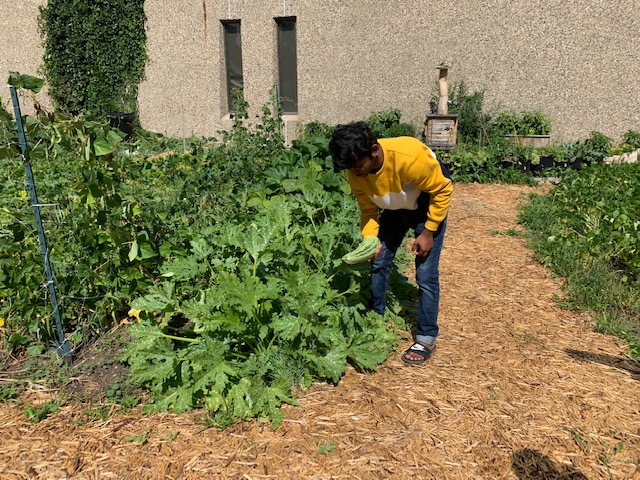The Regina Public Interest Research Green Patch Garden is a 5,400-square-foot vegetable garden behind the Dr. John Archer Library at the University of Regina, growing organic food for students and the community.

Every year the garden donates 1,500 to 2,000 pounds of food to those need with the help of volunteers, but this year is different due to the coronavirus pandemic and physical distancing rules.
All the work is done by just one person: the co-ordinator, Tayef Ahmed.
The 200-level human justice undergraduate at the U of R spends all his time in the garden growing and harvesting food to serve the rising number of students in need and also donate to charitable organizations.
“I have donated over 600 pounds of food and aiming to get to 2,000 pounds by end of the season,” Ahmed said.
“Normally we would have a lot of students, faculty and staff working in the garden.”
Ahmed said the demand for food from the garden this year shows the importance of gardening to tackle food insecurity.
“We are getting a lot of requests from students because they are not getting any jobs and some of them don’t have enough money to eat.”

Get breaking National news
“If we team up with a few people and start a community garden we will have enough food,” Ahmed said.
“As young people we have energy and time. We can do it.”
- ‘At first I cried’: How Iranian Canadians are reacting to the U.S. strikes in Iran
- Queen’s University students stranded in Doha after Iran attack shuts down airspace
- Khamenei’s death met with ‘jubilation’ among Iranian-Canadians: Liberal MP
- Attack on Iran triggers global flight disruptions, impacts Canadian travellers
The student gardener said he fell in love with gardening when he was two years old in his home country of Bangladesh, joining his neighbours and family members as they worked on their farms.
“We didn’t have any equipment so we used cattle to till the garden,” said Ahmed, recollecting the fond childhood memories.
“I’d sit behind the cattle and take a ride with them while they got their work done and I remember I enjoyed it.”
Ahmed moved to Regina in 2018 to study. He stumbled on an opening for the position of Green Patch co-ordinator last year and started gardening again.
“We are growing our own food; we are not relying on the supermarkets or other sources. Their vegetables are coming from different countries and may be one-month-old vegetables that don’t have enough nutrition.” Ahmed said.
“If we grow our own food we will have enough nutrition.”
Produce from the garden, including beans, carrots, tomatoes, squashes, zucchini, cucumbers and peppers, are also available to the public for free through the weekly pickup Facebook event page. There’s information about online workshops for people to learn gardening.
The RPIRG Green Patch was launched in March 2012 in response to the need for urban centres to invest in sustainable, locally-grown, secure food sources. It was expanded in May last year to include a perennial orchard in an adjacent courtyard.
The garden is open six months a year, April through October, with plans in the works for an indoor garden that can grow vegetables in fall and winter.
















Comments
Want to discuss? Please read our Commenting Policy first.